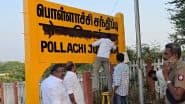Mumbai, Feb 22 (PTI) RSS functionary Arun Kumar on Saturday said Hindi should gradually progress as a common national language and rejected criticism of the language for "selfish" purposes amid a row over Tamil Nadu CM MK Stalin's accusation of "imposition" of Hindi.
Kumar also claimed all languages in India are national languages and there is no regional language.
He said lakhs of people from Tamil Nadu do certificate courses in Hindi and there is no need to worry about those who oppose the language for selfish purposes.
Speaking at ABP Network's Ideas of India Summit 2025, the RSS joint general secretary said it was wrong to draw parallels between what happened to Hindus and other minorities in Pakistan and Bangladesh, and the treatment of minorities in "broad-minded" India.
Also Read | Delhi LG VK Saxena Appoints Arvinder Singh Lovely As Pro-Tem Speaker of New Assembly.
The RSS senior functionary's comments came against the backdrop of the Tamil Nadu chief minister's opposition to the National Education Policy, which he has dubbed an attempt to impose Hindi.
Observing that disputes over language are unfortunate, Kumar said every state has to develop its language and conduct its business in that particular language.
He said there is no regional language in India. All its languages are national languages.
"We have an administrative setup and we need a common national language. At one point, it was Sanskrit but it is not possible today. So what can it be now, it will be Hindi today.
"If you don't want Hindi then you need to have one national language. If it is English then it cannot be a common national language. It will be a common foreign language," he added.
Quoting second RSS chief M S Golwalkar, Kumar said if English is made a common national language, then the existence of languages of the states will be jeopardised.
"Hindi should gradually progress as a common national language and that process should be natural. If you enforce, there will be a reaction. There is no need to worry about those who oppose it (Hindi) for selfish purposes," he added.
Kumar said, "In Tamil Nadu, where it (Hindi) is opposed, lakhs of people do certificate courses in Hindi. So there is no need to worry on that front".
Responding to a question on whether minorities in the world are in danger, Kumar replied in the negative in the Indian context.
"There was a lot of displacement over what happened in Pakistan and Bangladesh. In 1947, Hindus made up 32 per cent of Bangladesh's population, today, that number has declined to 8 per cent. In contrast, India had 8-9 per cent minorities in 1947 and today they constitute 14-15 per cent.
"So how can you compare (it with India)? What was the number of minorities in Pakistan when it was formed?" he asked.
Kumar said whatever happened to Hindus in Bangladesh and Pakistan (won't happen in India) because India believes that every way to profess faith is right.
He said, unfortunately, some people construe India's broad-mindedness as its weakness.
"We do face issues over it and we will address them satisfactorily within our Constitution. You cannot compare what happened with Hindus, Christians, and Buddhists in Pakistan and Bangladesh with others (minorities) in India. The comparison between the two is wrong," he said.
(This is an unedited and auto-generated story from Syndicated News feed, LatestLY Staff may not have modified or edited the content body)













 Quickly
Quickly


















